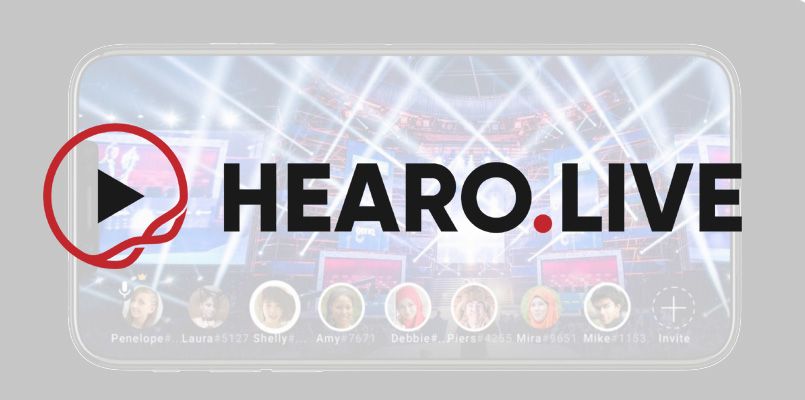Whether you watch Twitch, Mixer, or YouTube Gaming, video and live streaming has become the predominant way to enjoy your favorite gaming content. As the arena of video content expands, so does its chaos and noise. With hundreds or thousands of fans tuning in, live stream comments become impossible to read, and Discord channels are totally overwhelming. Too much community, instead of spicing up the experience, overwhelms it. Should game watchers give up on the social aspect of streaming?
In steps Hearo, aiming to be the solution to bring a sense of community and individuality back to live stream watching. Their pitch is simple:
Most large scale live streams (whether we are talking esports or Nintendo Direct) should feel like you're watching a pro game in a stadium or show in a theater. Fans watch together, and a raucous crowd makes the experience come alive. When something exciting happens, you want to hear the crowd react instantly, with groans and cheers.
And when you go to the game, you don't want to be stuck in a mosh pit full of drunk strangers -- you want to sit together with your friends. Even better, what you'd want is your own VIP box. A private room with the right amount of sound insulation, so you can talk to your friends without worrying about bothering everyone in the theater. You want the intimacy of sitting side by side with your friends and the fantastic sound of the crowd when it gets into the game. You want the awesome experience of going to the arena, without its hassles and costs.
DualShockers sat down with the creator of Hearo -- Ned Lerner, a well-worn veteran in the industry who has placed himself at the forefront of most emerging technology... often moments before they hit the mainstream. Starting his career with Chuck Yeager's Advanced Flight Trainer (arguably the game that launched Electronic Arts into their IPO and a household publishing brand), cofounding Looking Glass studios (System Shock, Thief), and creating some of the most fundamental precursor tech to both MOBAs and voice chat. Aside from working as an industry pioneer, Lerner took significant steps in the creation of the tech behind the PS4.
[pullquote]You want the awesome experience of going to the arena, without its hassles and costs.[/pullquote]
In discussion with DualShockers, Lerner made it known that he has always considered himself a pioneer in the industry and loves the freedom and innovation that comes with startups. "Someone has to go first!" Lerner joked.
Hearo leans heavily into giving content creators a more direct way to engage with their community:
If you think of Hearo as a stadium, our job is to get people in the seats and watch. But also we need people on the stage. We're a connector between the audience and the broadcaster. Content creators can't connect to their viewers on random Discord servers.
That's to say that far too often, sites like Twitch, Discord, and YouTube act like they own the world. They tell content creators how they can and can't engage with the people who care about their content. This means following strict rules of a mega Tech company like Twitch and YouTube, and with Big Brother monetizing their audience (and their audience's information) in the process.
Discord is used all over the place, but ultimately the ownership of those communities is by Discord. They monetize the creator's audience. Meanwhile, Hearo -- like a theater -- we let the content creators decide how they want to monetize that audience. The big guys, Discord, YouTube, and Twitch want to own the fans that the content creators attract and serve.
What does this mean? While Hearo isn't looking to be a replacement for YouTube or Twitch, it will let content creators and artists take the reins over the communities that they have nurtured and developed. They can turn the creator's own website into their home base, the best place to watch their content (and for you to enjoy it with your friends). If the creator doesn't have a website, Hearo even offers to help them make one.
On top of that, Lerner makes the point how while Discord may once have been a place for smaller gaming-oriented or team-based communities, that has shrunk as Discord has grown.
We talk to tons of people, and lots of folks we talk to don't know that Discord does voice. This sounds kind of absurd, but when you think about it, a lot of Discord servers have hundreds (if not thousands) of people. On those servers, only a core group -- 5, 10, 15 people -- are allowed to talk, and everyone else can only text chat. While Discord incentivizes people to grow their own mostly text-based server, Hearo aims for people to connect with their tight-knit circles.
Last but not least, we wanted to figure out what the future of Hearo looks like. Are gaming and live streaming just the entrance for a much broader platform? According to Lerner, yes. -- Hearo's first priority is being great for gaming.
We are starting with esports and game watching, which aren't small numbers.
But that isn't to say the Lerner is turning away from more traditional multimedia, including physical sports and TV providers. Lerner proposed what if you had a dedicated avenue to watch March Madness games with your friends? And while that may not be this year exactly, the opportunities for growth are very real.
Most importantly, Lerner underscores that while Hearo is in part a system to improve on voice chat, it is also a way to improve the content itself.
In the same way that multiplayer games (in my opinion) are more fun than single-player games, I feel the same way about video. If you can grab a friend or family member to sit down and watch, it becomes a lot more fun.
Hearo has soft-launched and is available now with a rotation of videos over at Hearo.Live. Check out the content over there, or download the app in Google Play or the App Store. For more information, follow Hearo over on Twitter.


